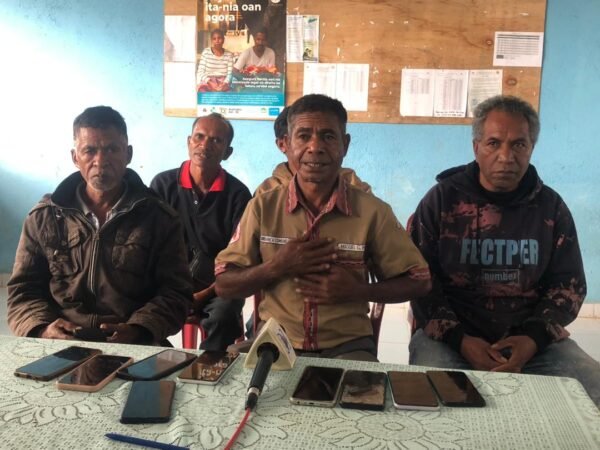Letefoho, November 22, 2024 (Média Democracia) – Related to climate change that the world is currently facing, especially related to real situations that occur such as the long hot summer in Timor-Leste, which has had a negative impact on agriculture in Lauana, Letefoho coffee production has decreased due to the lack of water and the coffee is starting to age.
Head of Village of Lauana, Miguel Maia said that, related with climate change which occurred cause long summer which affected dry springs and plants cannot growth well, especially coffee.
Xefe Suku Lauana Miguel Maia hateten, relasiona mudansa klimatika ne’ebé akontese, halo bailoron naruk afeta ba bee maran no plantasaun moris la di’ak, liu-liu plantasaun kafé sira.
“Therefore, the Ministry of Agriculture, Animal Husbandry, Fisheries, and Forestry is requested to be able to help the community through one of its parts, namely the rehabilitation of coffee plants, so it does not just stop, but must continue so that the community can care for their plants,” said the Head of Lauana Village to reporters in Pos Village, Tuesday.
He said that the development carried out in the area also had an impact on the damage to plants, especially samtuku plants.
“The impacts are that the crops and community production are dwindling, so in the future we ask the government to support agriculture through rehabilitation, nurseries so that they can help the community to replant crops that are now dry and old,” he said.
He explained that the existentialists placed by MAPPF in the villages were indeed active, but none of its components had planned to provide orientation to farmers.
“Existentialists in the village are indeed active, but for their activities to continue running there is no orientation from the leadership, so every day they are with us but do nothing, at least the Ministry must make a plan for the team so that the community can convey about bad lantation.” He explained.
The government must form a technical team to monitor these plants, because the team is not carrying out its duties properly.
“In 2023, rehabilitation has emerged through the Timor-Leste Coffee Company Association (ACTL) which is the only one that rehabilitates community coffee, the payment is from public money, bringing government money called public money which is said to be paid with 40% and 60% and the following year comes to continue repairing the plants then the company pays in full.” He said.
He said that it had been one year since the government had not kept its promise to pay the full 60% to the public.
“The local government is also confused, is the money in ACTL or still in the government because until now there has been no clarity, if there has been clarity from the local government there must be a letter, 60% of the government’s money must have been allocated to companies to pay farmers,” he said.
He explained that at the peak of the company’s arrival, his party as an officer felt happy and asked the community to clean their field quickly.
“The community also feels that this is something that makes people diligent, eventually making them lazy again, that’s why we always tell them not to focus on that, but on our own plants so that we can increase our plants,” he explained.
As Secretary of Lauana Village, Lúcio Soares added that the comparison of climate change between now and then is very different, because in the past the rain always came on time but now the rain comes late, the crops planted by the community do not produce well.
“We talk about climate change, we see a huge difference, because in 1979 the rain fell on time, but now it is not on time and all the plants have no results, we want to plant cassava but there are no results and this has a big impact on coffee too.” He added.
He informed that coffee needs shelter to be able to spread for its production, but the Samtuku plants are starting to become bare and some are experiencing troughs due to the earthquake.
“Coffee needs shelter, while the old samtuku plants have started to wilt, so there are no other trees that can shade the coffee and also other agricultural products such as cassava and so on, while the coffee that the government facilitates for the community to plant is different from the samtuku plants because it does not last long, so the community has no guarantee of other agricultural products, because coffee is the most beneficial for the community,” he said.
He emphasized that even though the community was carrying out cultural activities, the coffee they produced could be used for other things.
“Coffee provides great benefits to the community, although every year the community holds various cultural events, their houses are still built, and here there are only good houses, therefore the benefits of coffee rehabilitation are very large, because food or all their needs are purchased through coffee because coffee is the family economy in the Letefoho community.” He said.
In addition, Lauana Village has an area of 52 km2 consisting of 10 hamlets with a population of 3,959,991 houses, 1,989 men and 1,970 women and the people of this village live an agricultural lifestyle.
Meanwhile, this media program tour was held because the Association of Timor-Leste Journalists (AJTL) collaborated with OXFAM in Timor-Leste and received financial support from Oxfam Hong Kong.
Reported by : Estefania
Picture by : Estefania

